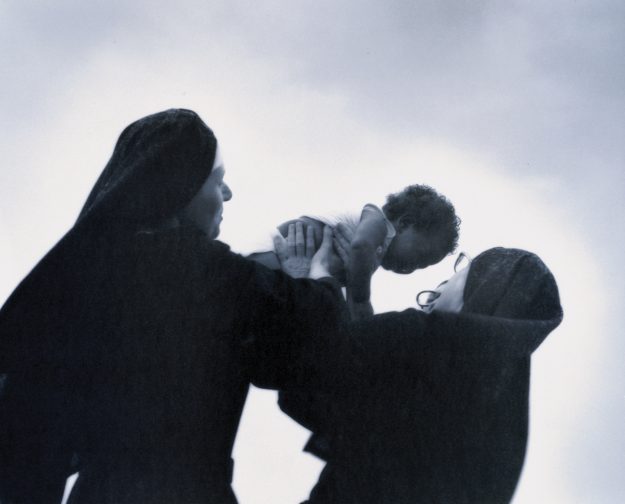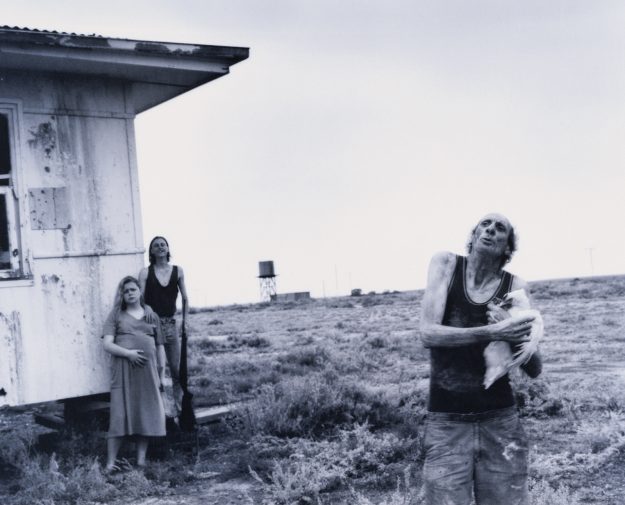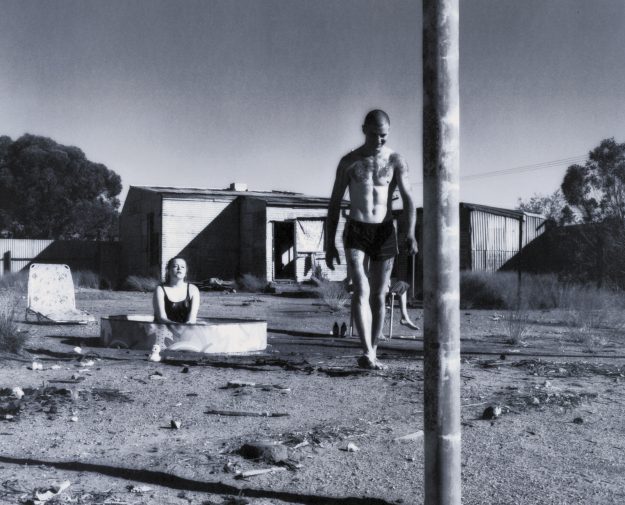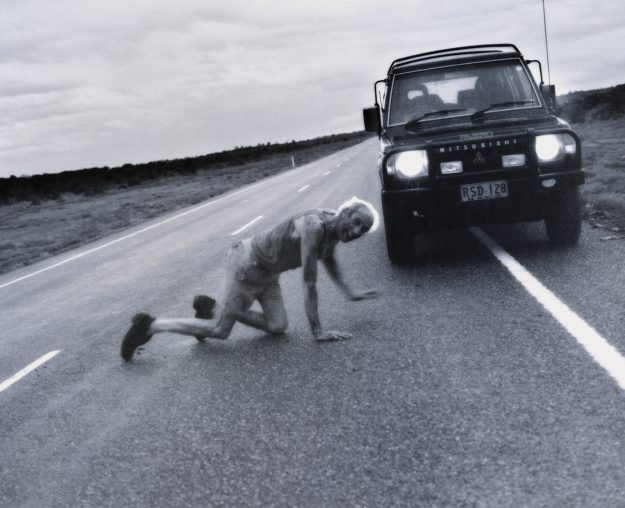People go to wild places to search for their true nature. Where is your true nature?
—Zen koan
My father, Max, lived alone for some years in Launceston, Tasmania, on a steep hillside with a view of the mountains and the town. He liked the light and the smell of the bush, the wallabies thumping their tails against the side of the house as they went down to drink at dusk. Then his health led him to move in with my sister, in Adelaide.
He said on the phone that he was dying and it would be nice to see me. I flew into Adelaide via Auckland and contracted a flu along the way. My body felt hot and gritty inside, and when I closed my eyes there was a dark swirling followed by lights that flashed and disappeared, like luminous plankton on a long night journey in tropical waters.
When I opened my eyes, Adelaide was there, turning from summer to autumn, and showing signs of global warming. The trees were gasping in public parks and had shed their leaves in the heat. Everyone spoke about rain, wanting rain, whether it would rain, the last time they had seen rain.
The hospice was in an old building of pleasant brick with new bits added on and trees around. He greeted me with delight: “Who are you? Never saw you before in my life!” He seemed to be playing with the idea that his relationship to consensus reality couldn’t be taken for granted anymore. We shook hands.

Wild places exist in people as well as in landscapes. When my mother was in hospice, she was resolutely herself. With the integrity of an animal, or of an archetype, she was prickly and hostile and sweet in a rhythm belonging to her alone. She didn’t adapt, and made few concessions to the requests of the living. In practice, this made her journey quite private.
I had unconsciously expected Max to follow the same path. He did something unexpected, though. He took off the jackets he had worn; he became interested in his dying, and in the complexity of his life. This brought him into a world in which wild places could be shared. The margins between us dissolved, and we were in no man’s land together: it was frightening, breathtaking, and satisfying. There was a feeling of a large awareness, both real and happy, in the room, holding us both. I came to see that my father and I had, without intending to, over many years, worked out ways of being together in the wild places.
He had found an ease with metaphor and art. My brother-in-law brought a TV into the windowless room and looped the cable around the overhead rail of the bed. Max waved at the spiral loops and said, “I appreciate the corroboree”—a corroboree is an aboriginal ceremonial dance. And in the room there were perhaps twenty origami cranes, made by my daughter during a recent visit. They had the bright patterns of wedding kimonos.
The margins between us dissolved, and we were in no man’s land together: it was frightening, breathtaking, and satisfying.
There were negotiations. He mentioned walking to the bathroom a few times until I said, “Well, I’ll help you up.” Then he ignored me. This happened a few times. Finally, I pushed things a bit and said, “I’ll help you up now, if you wish.”
With a large, childlike grin he said, “You are asking for a punch on the nose.”
I took this to mean that he wanted to get up but was in too much pain to carry out the plan. This sort of assessment was going on all the time. He was doing it and I was doing it, and the staff was, too. The method was to listen and guess, followed by more listening and guessing. I got him up a couple of times and he tried a few times more, but then he surrendered and didn’t get up again. He had no particular shame about having to be helped, but he was very aware of being caught in the ancient coils of having a body, eating, getting rid of the waste.

Then there was the matter of drugs, ordered by his oncologist. The monastic discipline of the medical profession is a worldwide phenomenon; the doctor was intelligent, well-trained, practical, decisive, and willing to answer all my questions. “The source of the cancer could be prostate or lungs, but we didn’t want to put him through an extra biopsy, and it doesn’t matter, does it?” He was also inclined to the stoic and bleak, or perhaps I could say that his consolations were those of the scientist who adheres to the data at hand and makes few speculations about whether life has meaning.
“What’s the likely course?”
“Well, the metastases in the bone will eventually collapse the spine onto the nerves and stop his breathing, probably in his sleep. Three weeks.”
I took his clarity as a kindness. I had a week to spend with Max before I was to teach a retreat in California.
Hospice patients have acute conditions; they either die or move out, and their doctors tend to whack the pain with a blunt instrument. The drugs made Max miss his own experience, though, and he understood this in some animal way and backed off from them. When he fell behind the pain, the nurses gave him a large dose and he was loopy again. This unsatisfactory cycle went on until a palliative-care doc took over and gave him a pain patch. Meanwhile, we brought him single malt whiskey, which was a good placebo.
When I stepped out into the sunshine after my first visit to the hospice, I was disoriented. I zipped off in my dad’s VW diesel, wondering for a puzzled moment why all the traffic was coming toward me on the wrong side of the road.
I wasn’t aware of any need to say deep things or to improve my relationship with my father, so when the pain negotiations were finished—something my sister accomplished with persistence and verve—the question became a matter of what Max and I would do together.
When I’ve been sick, for example with fever, I can be happy as long as I listen to what the universe, represented by the state of my body, allows me to do. It’s as if there is an awareness inside that knows what that is. This awareness treats my thoughts as hypotheses. I have the thought “I’ll watch a movie,” and, no, it won’t let me do that. “I’d like to eat,” no, not that. “How about reading?” Yes, but barely—not physics, try fiction. Nothing appeals. “Well, then, I’ll lie here and be here.” Yes, that. The awareness is not always minimalist; it might let me walk in the garden but not discuss business.
I don’t know if that was what was happening with Max, but that was how it was for me to be with him. I sat with him, and nothing much else was needed or possible. I had no impulse to read or chat. He was clearly glad of the company. And now and then we would talk.
A hint of openings to come had appeared on a previous visit, more than a year earlier, when he had said, “I’d like you to give me something.”
He just bought a car, I’d thought, I wonder what he wants? “I’d be happy to,” I said. “What would you like?”
“Just something you use everyday, like that traveler’s clock you have. Something that’s yours, so I can put it on my chest of drawers and think of you when I look at it in the morning.”

Now, in the hospice, he was wandering in the dark at first, but his mind cleared when the pain meds changed. When he was clear, Max’s stories gave shape to his life. In his generation there were men who talked about the war incessantly and paraded in uniform, and others who rarely mentioned war or medals and never paraded. He was of the second type. The war stories he did tell were in two categories. They were stories either about life and sensibility in the Jane Austen mode, slightly poignant, or of the clash between ability and circumstances. Either: “I was kicked out of the Army because they found out I had lied about my age—too young—and that’s how I ended up in the Air Force.” Or: “I sat in the back of the math classes for the officers, though not being an officer I couldn’t get credit. ‘It’s a pity you are not an officer,’ the instructor said, ‘you would be top of the class.’”
He also told antiheroic stories about how he kept getting sent to the wrong place an hour before the Japanese Army took Amban (or, another time, Lae). The CO swore at him to make him feel better about leaving and told him to get his bloody useless men back on that bloody DC3 and go the hell back where they damn well came from, and that’s how he escaped from being finally and completely dead at that time. In another antiheroic story, he told about shooting down a plane that was firing at him; it turned out to be an American Wildcat—the pilot was trying to draw attention to himself because he was disabled and being chased. “I had to buy the pilot a case of beer. He was decent about it.” These stories, like other comedies, were about how lucky it is to be alive.
In hospice, he began an experiment in discovery and improvisation. Each morning, I asked, “How are you?” Apart from dying, I meant. One morning he gave me the force of his predicament:
“I have a problem. I want to get home, but I can’t work out any way to do that. I can’t work out how to solve the problem. I really, really want to go home, but I just can’t work it out.”
“Yes.”
I was struck by the thought that this is the way you take on koans. The situation is insoluble and you hang around with it and something shifts to another level. At its simplest, the problem was that he needed more care than he could get at my sister’s home. At other levels, in which having a body is a metaphor as well as a shape to breathe in, I wasn’t sure: he seemed to be free sometimes as we talked through the long afternoon. And he was at ease with the contradictions of being human, the way characters in Shakespeare are. A predicament automatically thrusts you into wild places. Sometimes he was moved to make a small speech.
Each morning, I asked, “How are you?” Apart from dying, I meant.
“You know what little presence there has been of you in my life—what little presence, no one’s fault, of course—I’ve enjoyed.”
“Indeed. And I have enjoyed our meetings too.”
My father and I had separated when I was seventeen and hadn’t reconnected until I was living on the far side of the world.
Max had an easy, catlike quality and had taught unarmed combat during the war. His litheness was enjoyable to be around and translated to other dimensions of life. I learned classic moves for meditation and poetry from that quality. He also showed me a few fighting tricks with the air of someone who thinks that the tricks might be useful but that they don’t really touch what life is about.
It was a working-class world and fights occurred, not often, but memorably. I had an aversion to them, stemming from laziness, cowardice, or intelligence, it wasn’t really clear. I could usually, not always, think my way past fights that were casually offered. The difficulty with my father belonged with me, though, and couldn’t be dodged. Our generations were set against each other by the times; to him, Vietnam looked like World War II. Ideas were separating people everywhere you looked.
One time we faced each other in the living room as if we were in a western. The living room was a small space in which Danish modern furniture with skinny wooden arms and green cushions had recently and proudly replaced the walnut nineteenth-century chaise longue and sideboards.
A street fighter hits you just before you have convinced yourself to fight, but something more complicated was going on with us. We were listening and guessing. He was more skilled, but I was an athlete, fitter and quicker, and it wasn’t clear to me who would win or if it would be good to win. In the middle of that waiting, time began to spread out and we relaxed. This might have been a bad sign, meaning that the posturing was over. But then the space around things got larger still. No time was taken up by this expansion, but during the interval it came to me that fighting was not a good idea. An explanation of this would be that if I lost, I lost, and if I won, I lost—we would walk through a one-way door—but it wasn’t a reasoned decision. The clarity was an absence of reasons. We didn’t like each other any better, and there was no satisfactory resolution, but the seriousness and tension drained away, and this became a moment of seeing through things, the emptiness of plans—the emptiness of what we each thought was crucial. Zen happened to us.
In the story of the Buddha’s early life, there is a moment when, as a child, Siddhartha sees things just as they are, without wanting anything to be different. Later, his awakening builds on this simple discovery. This moment with Max seemed like such an opening in time. Not a mystic revelation, but not delusion either—simply a piece of clear-mindedness, a gift. If consciousness is always making up its best story, these are moments when it doesn’t—when it is not really committed to the way it thinks things are.
Now, this is not such a big deal, really, but the important moves in consciousness are the small moves that bring about larger shifts. It’s not that my dad and I were wise; we just stopped holding our prejudices, and it became obvious what to do, which was mainly what not to do. The opposite of hell was not heaven but an unselfconscious simplicity.
Back in the hospice we moved him to a room with a slant of precious sunlight and a potted palm outside the French door. It seemed a blessed tree.
“So how are you, Dad?”
“I’ve been thinking. I’ve changed a lot since I was young.”
“You have?”
“Yes, I have.”
“How so?”
“Well, I’m a lot more easygoing than I used to be.”
I took this dialogue as an acknowledgment of past difficulties.
“I’ve changed a lot, too.”
“Really?”
“Yes, I have.”
“How is that?”
“I’m a lot more easygoing than I was.”
He smiled a quiet, private smile, and that was it for working through our past.

I made my first visit home to Tasmania in 1984, after over a decade, returning on the plane across Bass Strait as something incomprehensible—a Zen teacher, exploring the deep passages of the mind.
I wrote a poem about the cottage in which I grew up, where he and my mother still lived. They were kind enough to take the poem as an offering. It begins like this:
The Source
No memory warned me
how particular and true
the doll’s house where I grew would be,
the kitchen smell of rosemary, my father’s
cough, the green spots
on the bells of the snow drops.
Sap rises in the almonds to
the first of bloom,
the blossoms open one and two and three
like stars at evening.
In the hospice he was still sorting his life.
“You know I really loved Alison, I really loved her, but you know how you sit down with someone and you get some paper and draw the lines and make squares. And then you move the squares around together till they connect. No matter how I tried to line them up, it didn’t work. No matter how hard I tried.”
There wasn’t any blame in this—he was trying to make out the pattern in his relationship with my dead mother. And it was true that you could work things through with him, but she didn’t do that. Sitting with him in the hospice, it was clear that the deep passages of the mind were not alien to him after all. Sorting took other forms, too.
“The flight lieutenant said to me, ‘You are a strange, intelligent bird, Tarrant, what should we do with you?’
‘I don’t know, sir.’
‘Well, we’ll find things for you to do.’
They got me to run an anti-aircraft battery. They were fifty-caliber machine guns. We weren’t meant to shoot anything down, just to keep the Japanese bombers honest and force them up to a height at which the ack-ack could come into play.”
He told me about another moment of seeing through the forms of things.
“Some of those Japanese pilots could speak English, you know. We shot one down and had him in the cells. I had a bad feeling that night, so I dropped in for a visit. The guard was knocking the pilot around. Oh, he was a nasty piece of work. Withers was his name. I told him, ‘You can stop that right now and clear out.’ He wasn’t happy about it at all, didn’t want to go. The pilot spoke English because he had grown up in Hawaii, you see. Quite good English—a polite feller.”
“What did you do, though?”
“Oh, Withers. I put my rifle on him, and told him I’d shoot him on the spot. I had him transferred the next day.”
A couple of things stand out for me in this story. One is that he remembered the process by which he made the decision—he had a bad feeling and listened to it. The other is that, at the most intense moments, objectivity and clarity appear in the form of empathy. Max was a teenager then; that clarity must be a natural possibility in consciousness, something available to us at any time.
“What are you thinking about today?”
“I’m wondering about my attitude…well, not my attitude to the butcher, but my attitude to my attitude.”
He thought that dying was difficult sometimes and matter-of-fact at other times, but then what did he think about what he thought about? Here was afternoon sunlight and conversation and the great palaces of memory that seem to fling their doors open at the end of life. Even though everyone says that you review your life, you actually do review your life. And the bare act of noticing is harder than it looks. This attempt to look at your attitude—what you are feeling and thinking and the frame that holds it, and then your attitude to your attitude, is one of the routes to freedom.
I had always assessed my father in various ways, and I had hoped to change my assessment in a positive direction. Lots of psychology hopes for such results, but it takes effort, and I have no talent for it. What was valuable was to stop assessing each other—that was the intimate thing. We could meet there and be happy.
In a dream nine months after his death, I bought licorice with my dad at a shop down the hill from our house in Launceston. I bought other sweets as well, and felt a bit ashamed at how many. We walked back slowly, his feet splayed out for balance like Charlie Chaplin’s, patiently lifting and extending and placing themselves down as we walked up the hill toward my childhood home. He seemed older. Death had not stopped that process.
If we had decided that Max’s dying would hurt unbearably, that would have been all right. But we didn’t decide anything; we decided to step into an open paddock together. Something more interesting than hurting happened.
I mentioned that I was leaving the next day a couple of times. There was no reaction.
“This is my last day here.” My third repetition.
“I’m very well aware of that.”
Oh, silly me. Then, when it was actually time to leave, to leave the bardo of the hospice and go back to the other bardos that I think of as my life, I said, “I’m leaving in the morning. Is there anything you would like to say?”
“Yes, there is.”
“What is that?”
“I would like you to do something about the weather.”